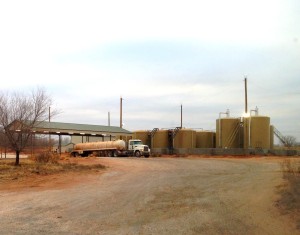*This article is not a substitute for the advice of an attorney.*
Last week, the Texas Railroad Commission heard an important dispute regarding whether local groundwater conservation districts have the right to protest disposal well permits.
Background
In order to drill a disposal well, a company must obtain a permit from the Railroad Commission of Texas. Frequently, local Groundwater Conservation Districts challenge these permits, citing concerns about contamination of groundwater. This is particularly true in the Eagle Ford Shale region, where some GCDs challenge every disposal well petition in their area seeking to require additional safeguards to protect their water supply.
In this particular case, the Gonzales County GCD challenged a permit filed by Marathon Oil Company. Specifically, the GCD was concerned that the disposal well may contaminate brackish groundwater in the area that may be able to be used for human consumption as desalination technology continues to advance.
Marathon argued that the GCD was not allowed to challenge the permit for two reasons. First, Marathon argued that because the proposed disposal well would be located 4 miles outside the Gonzales County GCD’s jurisdiction, meaning that the GCD had no authority. Second, a much broader argument was made that a GCD was not “affected” by a proposed permit and, therefore, had no standing to protest disposal wells before the RRC.
The Law
Under Texas law, the Railroad Commission of Texas regulates oil and gas production in the state, including the permitting process for disposal wells. Under the Texas Administrative Code, an “affected person or local government” may protest a disposal well permit. See TAC 3.9(5)(E). An “affected person” is defined as a person who has suffered or will suffer actual injury or economic damage other than as a member of the general public or as a competitor, including surface owners of property where the well would be located and operators of nearby wells. See id.
The rules require that a party seeking a disposal well permit must provide notice of a permit application to certain affected persons including the owner of the surface tract where the well will be located, operators of wells located within 1/2 mile of the proposed well, the county clerk where the proposed well would be located, and the city clerk if the well will be located in a city. See TAC 3.9(5)(A). For commercial disposal wells, affected persons also include the owners of adjoining surface tracts. See TAC 3.9(5)(B). Further, in addition to the list above, the Railroad Commission may also determine on a permit-by-permit basis if other classes of persons, such as underground water districts, should receive notice of a proposed disposal well permit. See TAC 3.9(5)(C). Finally, in order to ensure all affected persons are aware of the proposed well, notice must be published in the newspaper. See TAC 3.9(5)(D).
The Decision
Initially, a RRC hearing examiner sided with the GCD, finding that it did have standing and should be allowed to challenge Marathon’s permit application before the GCD. [Read Memorandum here.]
Last Thursday, however, the Railroad Commission found in favor of Marathon Oil. The three-person panel found that in this particular case, Gonzales GCD lacked standing because the proposed disposal well was located beyond the district’s bounds. The Railroad Commission did not, however, reach the issue of whether a GCD would have standing to challenge a permit within the district’s bounds. The Gonzales County GCD could appeal this decision to the Texas court system if they so desired. For more information, click here and here.
What Does This Mean?
This case is just another example of the clash between producing oil and gas and protection Texas groundwater. It is important to realize that this decision was limited in scope to the specific facts in this case.
Because the RRC decided only the limited issue of whether a GCD may challenge a disposal well permit where the proposed well is located outside of GCD bounds, this decision will likely have limited impact beyond these specific facts. The RRC was clear that it was not deciding whether a GCD ever had standing to challenge a disposal well permit, and one commissioner stated that were this well located within the district bounds, there would be a “very different conversation.”
Also, it is important to note that this decision merely means that the Gonzales GCD cannot intervene and protest the Marathon permit request. Other “affected parties” may still continue with protests and the RRC will still analyze the permit in accordance with the Commission rules.













